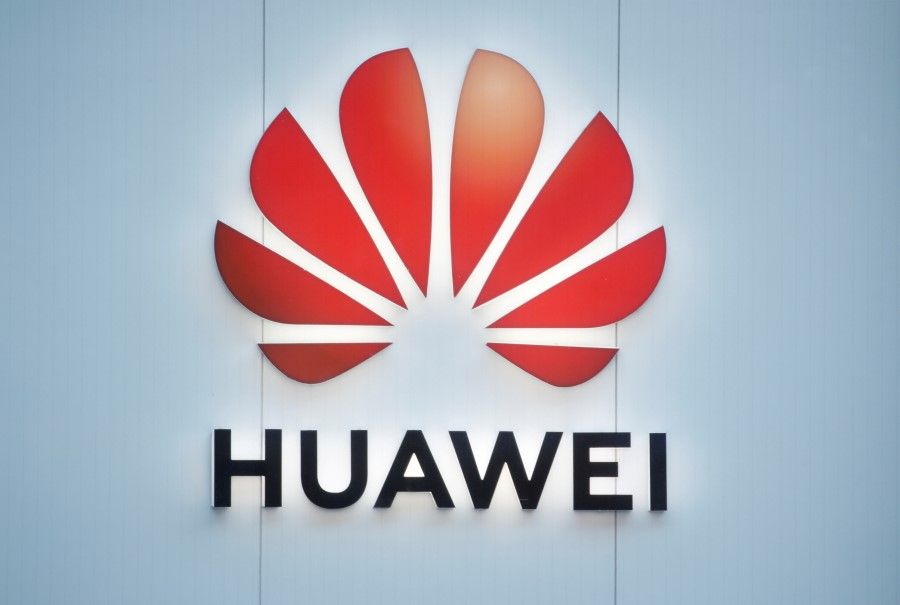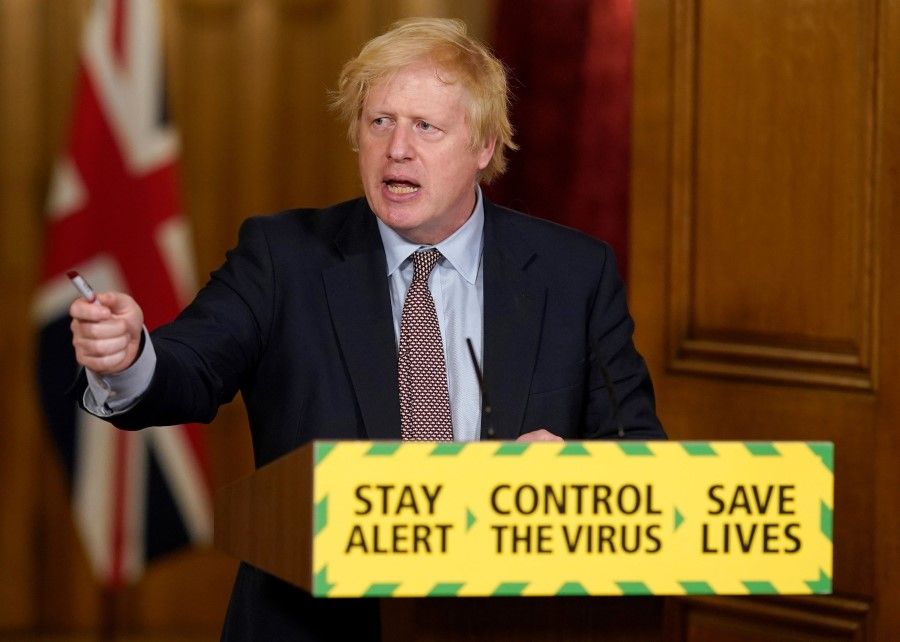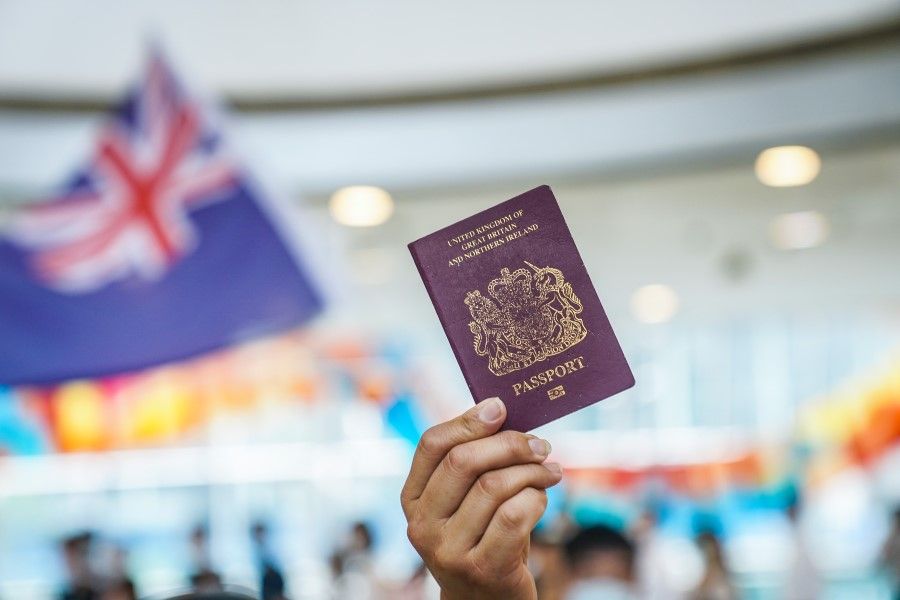From 'natural partner' to the opposition: UK's China policy veers towards the US amid Covid-19

Britain is highly independent in its diplomacy; it does not just follow the US. Geopolitically, the UK's foreign policy is more aligned to that of its neighbours in Europe, than that of the US. The UK considers global issues from a European perspective, and not from the US or transatlantic perspective.
Britain's finance minister attended the BRI forums in Beijing in 2017 and 2019, and Britain was described as China's "natural partner". Britain clearly sees the BRI differently from the US.
Moreover, the UK's positive view of the opportunities afforded by China's economic growth reflects the pragmatism in its foreign policy. It is more inclined to recognise the reality of power and actively seeks economic benefits outside of the US. The best example is Britain taking the lead in joining the Asian Infrastructure Investment Bank (AIIB).
In 2013, when China proposed plans to set up the AIIB, the US persuaded its allies to oppose this new organisation. Initially, Japan, Korea, Australia, and all major European countries decided not to join the AIIB. On 13 March 2015, the UK officially applied to join the AIIB; on 16 March, Germany, France, Italy, and Luxembourg joined the AIIB, leaving Japan and the US the only major countries that declined to join. Britain joining the AIIB was a major victory for China, as it led other countries to join.
Purchasing 5G equipment from Huawei is another classic case of Britain not following the US. On 28 January 2020, the UK government decided to allow Huawei to provide equipment for the UK's 5G network, such as antennas and base stations. Britain has also actively participated in China's Belt and Road Initiative (BRI). Britain's finance minister attended the BRI forums in Beijing in 2017 and 2019, and Britain was described as China's "natural partner". Britain clearly sees the BRI differently from the US.

China-UK relations turning frosty
But the coronavirus and the national security law for Hong Kong is rewriting China-UK relations. These two incidents have pushed the UK towards the US, and China-UK relations are worsening. The US has gained another ally in isolating China.
First, the coronavirus has caused Britain to reconsider China-UK relations. As of today, the UK has seen over 40,000 coronavirus deaths, while British Prime Minister Boris Johnson was also infected and hospitalised, later admitting that his prognosis could have gone either way. The UK is angry, and in late April, Conservative MP Tom Tugendhat, Chairman of the Foreign Affairs Committee in the British House of Commons, harshly criticised China for playing down the coronavirus outbreak in the initial stages. He also claimed that Britain needs a better understanding of China's economic ambitions and global role, but would not be "anti-China". And in a commentary for The Mail on Sunday, he wrote that Britain "needs to consider its relationship with China".
When the US government started calls to investigate the Wuhan Institute of Virology and seek accountability and compensation from China, Britain's ministers said on 2 May that Britain's focus was on fighting the coronavirus, and issues such as the source of the coronavirus and compensation could come later. Clearly, the British government is distancing itself from the US. At the same time, British think tank the Henry Jackson Society published a report "Coronavirus Compensation? Assessing China's Potential Culpability and Avenues of Legal Response" that was widely disseminated globally. According to the report, Johnson should claim £351 billion from China for the coronavirus.
On 28 May, the US, Canada, Britain, and Australia released a joint statement, which said: "China's decision to impose the new national security law on Hong Kong lies in direct conflict with its international obligations under the principles of the legally-binding, UN-registered Sino-British Joint Declaration. The proposed law would undermine the One Country, Two Systems framework."
The US took advantage of the coronavirus to issue a call to "reconsider" the Huawei issue. In late February 2020, deputy assistant secretary of state for cyber and international communications policy Robert Strayer said the Trump administration has not given up on stopping Britain from using Huawei's equipment for its 5G network. He warned again that allowing Huawei in, would threaten intelligence sharing between the US and Britain. And in late April, Britain's permanent under-secretary at the Foreign and Commonwealth Office and head of the Diplomatic Service Simon McDonald revealed that the British government had made a firm decision that would not be reopened. Clearly, British diplomacy shows rationality and a spirit of fair play. Johnson has not made any statements against China. (NB: However, in recent months, close allies of the PM have said that China's behaviour during the Covid-19 pandemic will eventually result in a "reckoning". British Foreign Secretary Dominic Raab has said that it cannot be "business as usual" after the crisis. The UK has also shown that it is moving to decrease its reliance on Huawei in building its 5G infrastructure and is looking for alternative partners such as NEC Corp and Samsung Electronics. The PM has reportedly tasked officials to scale down Huawei's involvement in the UK's 5G infrastructure by 2023. Most recently, US Secretary of State Mike Pompeo said the US stands ready to assist the UK in areas such as developing "trusted 5G solutions that protect their citizens' privacy".)

Second, the national security law for Hong Kong has led to a rapid deterioration in China-UK relations. After China rolled out the security law, Johnson and the British government criticised the Chinese government. On 28 May, the US, Canada, Britain, and Australia released a joint statement, which said: "China's decision to impose the new national security law on Hong Kong lies in direct conflict with its international obligations under the principles of the legally-binding, UN-registered Sino-British Joint Declaration. The proposed law would undermine the One Country, Two Systems framework."
On 2 June, Johnson wrote in The Times that the political freedoms under the Sino-British Joint Declaration were at risk of being severely curtailed. Britain could change its immigration rules and allow those holding British National (Overseas) passports "further immigration rights", which could place them on a route to citizenship. He wrote: "If China proceeds... Britain would then have no choice but to uphold our profound ties of history and friendship with the people of Hong Kong."
What that means is the Sino-British Joint Declaration is out of date and not an international obligation.
On 3 June, Chinese foreign ministry spokesperson Zhao Lijian said the UK has no sovereignty, no jurisdiction and no right to supervise Hong Kong, and sternly rebuked Britain's comments about Hong Kong. He added: "China and the UK negotiating and signing the Joint Declaration is all about China's resumption of sovereignty over Hong Kong... The basic policies regarding Hong Kong declared by China in the Joint Declaration are China's statement of policies, not commitment to the UK or an international obligation as some claim."
Whether the Sino-British Joint Declaration is China's international obligation has become the basis of a legal tussle between China and the UK. On 1 July 2017, the Chinese government said through a foreign ministry spokesperson: "...the arrangements during the transitional period prescribed in the Sino-British Joint Declaration are now history and of no practical significance, nor are they binding on the Chinese central government's administration of the Hong Kong SAR. " What that means is the Sino-British Joint Declaration is out of date and not an international obligation.
A professor at the Central Party School of the Communist Party of China said Hong Kong's sovereignty lies with China, but the rights of governance lie with the people of Hong Kong, while Hong Kong's position and order lie with the world.
On 3 June 2020, Johnson said if China goes ahead with the national security law that goes against China's international obligations as set out in the Sino-British Joint Declaration, Britain will not walk away from the people of Hong Kong. A professor at the Central Party School of the Communist Party of China said Hong Kong's sovereignty lies with China, but the rights of governance lie with the people of Hong Kong, while Hong Kong's position and order lie with the world.

HSBC in Britain has also become caught in the middle of China-Britain-US relations. It kept silent after the security law was passed. Subsequently, on 2 June, Beijing Daily released a commentary on WeChat titled "HSBC will lose all its clients", which was later shared on WeChat by People's Daily. Former Hong Kong Chief Executive Leung Chun-ying also put pressure on HSBC by criticising it for not expressing its support for the proposed law. On 3 June, HSBC expressed its support for the security law, but on 9 June, Pompeo criticised HSBC for its "corporate kowtow", saying that its "show of fealty seems to have earned HSBC little respect in Beijing".
Britain's opposition to China would embolden Australia and Canada to challenge China as well. Is the Five Eyes alliance becoming an anti-China alliance?
On 10 June, responding to a question during the Prime Minister's Questions (PMQs) session in parliament, Johnson said, "When we have serious concerns as a country... we must feel absolutely free to raise those issues loud and clear with Beijing and that's what we will continue to do." The issues Johnson is referring to include issues of serious concern to Britain, such as the origins of the coronavirus, Hong Kong, and critical national infrastructure.
Strategically, Britain's policy towards China is now closer to the US, which is in line with what the Trump administration needs in its current strategy of isolating China. Britain's opposition to China would embolden Australia and Canada to challenge China as well. Is the Five Eyes alliance becoming an anti-China alliance?
